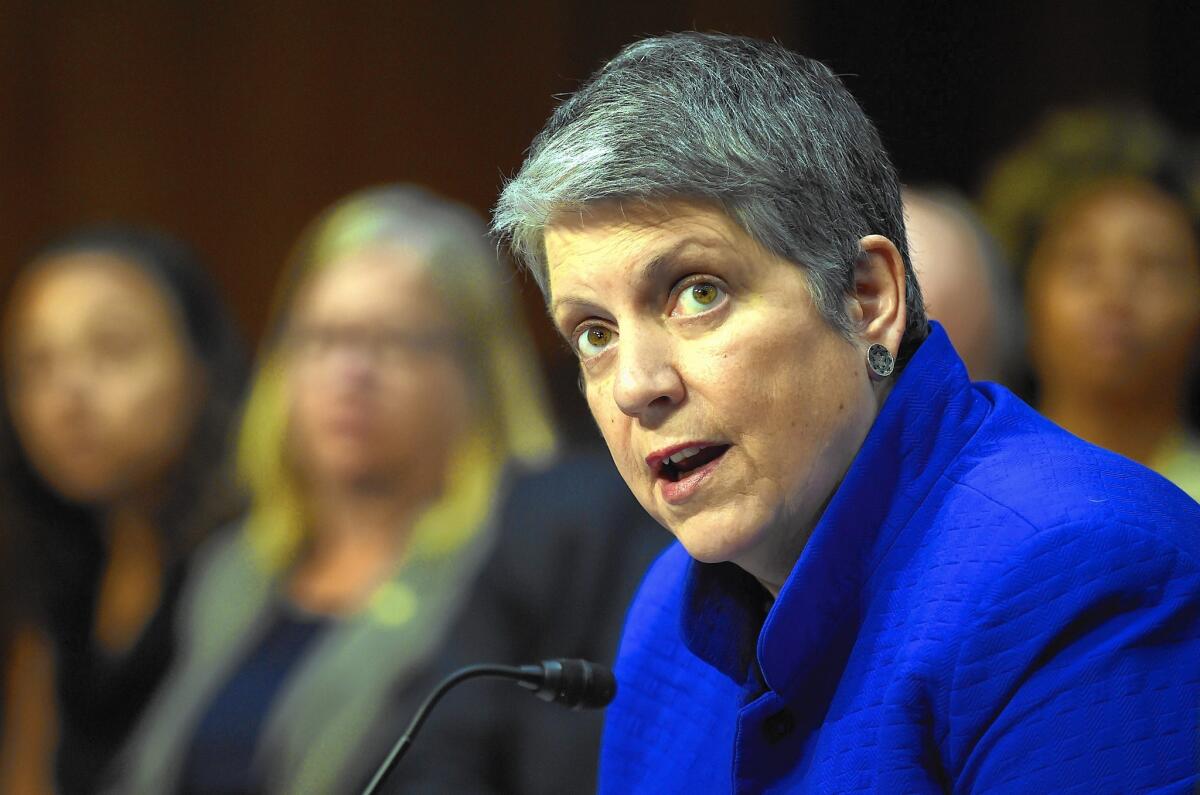Higher Learning: Why UC regents’ next meeting is likely to upset some Jewish groups

- Share via
The passionate politics of the Israeli-Palestinian conflicts may seem off topic for a university governing board more accustomed to setting tuition levels, approving the salaries of campus chancellors and managing a vast hospital system.
But emotions surrounding the Middle East situation are expected to be felt once again at next week’s meeting of the UC Board of Regents.
The regents are scheduled to review a new statement of “principles against intolerance” that condemns bias, violence, threats and hate speech based on race, ethnicity, religion, citizenship, sex or sexual orientation.
According to a proposed draft, “everyone in the university community has the right to study, teach, conduct research and work free from acts and expressions of intolerance.”
The statement adds that it is not intended to inhibit faculty’s classroom lectures and scholarship or students’ political or literary expression protected by “academic freedom or free-speech principles.”
Such a broad and generalized statement clearly will upset some Jewish groups that want UC to formally adopt a U.S. State Department definition of anti-Semitism that includes the demonization of Israel and denials of that nation’s right to exist, among other things. Those groups, which will be presenting petitions to the regents, say that anti-Israel protests and activism on UC campuses sometimes cross the line into anti-Semitism and create a hostile environment for Jewish students.
The regents also have heard from faculty and students who say they fear that any such definition of anti-Semitism is too specific and could curtail freedom of speech on the 10 campuses. They are worried that someone who criticizes Israel’s treatment of Palestinians in the West Bank or Gaza regions it occupies could be labeled a bigot and face disciplinary action.
The UC statement stays away from a specific definition of anti-Semitism because regents and administrators thought it would be better to address intolerance “over a broader spectrum” that includes anti-Jewish bias and other forms, UC spokesman Steve Montiel said. He noted the matter probably will trigger “robust discussion” at the regents’ meeting Sept. 17 at UC Irvine, and might change over the next few months before the regents possibly decide to take a formal vote on it.
UC President Janet Napolitano and UC Regents Chairwoman Monica Lozano declined to be interviewed on the issue in advance of the meeting, Montiel said. Napolitano, who is a former U.S. secretary of Homeland Security, said in a radio interview in May that she personally supported the State Department definition but that it would be up to the regents to decide whether to use it at UC.
The issue arose in part as a result of several troubling incidents this year at UC schools, including the defacing of a Jewish fraternity house at UC Davis with Nazi swastikas in January. In February, several student government leaders at UCLA questioned a student’s for a campus judicial panel because she is Jewish; those leaders later apologized and the student was unanimously approved for the position. A video of parts of the meeting went viral, triggering national concern about Jewish students possibly being excluded.
The proposed “statement of principles” seems to have those incidents in mind. It includes a “non-exhaustive list” of behaviors it says “do not reflect the university’s values of inclusion and tolerance.” Among those are vandalism and graffiti with symbols of hate, including swastikas and nooses; questioning a student’s fitness for a leadership role based on race, religion, ethnicity, gender and other factors; and depicting ethnic or racial groups as less ambitious, less talented or more threatening than others.
NEWSLETTER: Get the day’s top headlines from Times Editor Davan Maharaj >>
Groups pressing for UC to adopt the State Department definition of anti-Semitism are disappointed. But they will continue to lobby the regents over the next months, said Tammi Rossman-Benjamin, director of the AMCHA Initiative, an organization that seeks to combat anti-Semitism at colleges and universities. If the regents do not take more concrete actions, “Jewish students will continue to suffer and anti-Semitism is going to get worse,” said Rossman-Benjamin, who is a lecturer at UC Santa Cruz.
Rossman-Benjamin said the goal is not to discipline or silence anti-Israel activists. She said having the State Department definition as a standard could lead to self-regulation of behavior and speech.
Last revised in 2010, the State Department definition also says it is anti-Semitic to compare Israeli policy to that of the Nazis and to blame Israel for all interreligious or political tensions.
The Jewish Voice for Peace organization, which has been critical of Israeli treatment of Palestinians, is among the groups pressing regents against adopting the definition. The State Department terminology “is overly broad” and could have a troubling effect on campus life and learning, said Tallie Ben Daniel, coordinator of the group’s academic advisory council.
Ben Daniel, who earned a bachelor’s degree at UC Santa Cruz and a doctorate at UC Davis, said anti-Semitism should not be addressed separately from other prejudices, including anti-Muslim bias. She also said she does not believe UC is a hostile environment for Jewish students.
Similar disputes have rippled through UC in the past. In 2013, the U.S. Department of Education exonerated the Irvine, Berkeley and Santa Cruz campuses of allegations that they fostered anti-Semitic climates by allowing protests against Israeli policies and other incidents that Jewish students contended amounted to harassment. In 2010, a group of Muslim student protesters disrupted a UC Irvine speech by the Israeli ambassador and later faced school discipline and criminal prosecution that their defenders considered overly harsh.
Twitter: @larrygordonlat
MORE EDUCATION NEWS
Don’t panic, officials say as California braces for lower student test results
What Californians can learn from other states’ Common Core test results
Cal State data breach hits nearly 80,000 students
More to Read
Sign up for Essential California
The most important California stories and recommendations in your inbox every morning.
You may occasionally receive promotional content from the Los Angeles Times.











